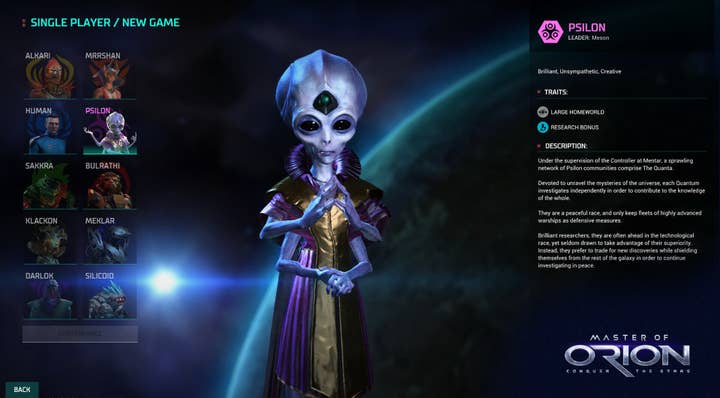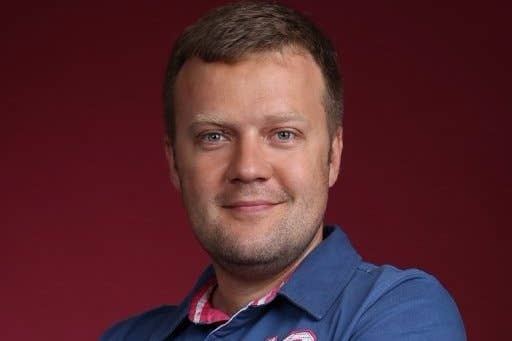Wargaming Labs: What is it good for?
Wargaming is experimenting through its in-house innovation platform, but which direction will WG Labs take from here?
Wargaming Labs is, according to its parent company, "an agile platform set to foster innovation within the games industry." Designed to support developers with near-complete games, at first glance WG Labs appears to be an attempt to use Wargaming's extensive infrastructure to support the industry at a grassroots level.
So why is the first release from Wargaming's innovation engine a reboot of Master of Orion, a 20 year-old strategy game rescued from the ruins of Atari? The answer is that WG Labs was actually founded with a pragmatic aim: to publish a paid game at the behest of the Wargaming's CEO, which existed outside of the company's free-to-play, multiplayer comfort zone.
As a result, WG Labs is not solely a free-form platform for innovation for aspiring developers; it's a space for Wargaming to break free of the constraints of its own corporate identity and launch titles without risking the central brand. And though the two aims may seem complementary in their experimental nature, it will prove challenging for the WG Labs team, in the short term at least, to balance the two.
"WG Labs is a space for Wargaming to break free of the constraints of its own corporate identity and launch titles without risking the central brand"
To begin to understand the inconsistency at the heart of WG Labs, it is important to understand that the company was founded long after Master of Orion, its first game, entered the Wargaming stable. The Master Of Orion brand was picked up by the company in August 2013, along with the Total Annihilation IP, during the fire-sale that preceded the demise of Atari. At the time, CEO Victor Kislyi claimed that he would put "all of Wargaming's power behind it [Master of Orion]" in an effort to get the game to market. Nearly two years later, in June 2015, the game, which was developed by Argentina's NGD Studios, was officially announced and featured in the company's E3 presentation.
However, there was a problem. Wargaming is best known for World of Tanks and World of Warships, both of them multiplayer games operating under a free-to-play business model. Master of Orion, on the other hand, is a premium-priced turn-based strategy game. In short, Wargaming was not the obvious choice as publisher, and WG Labs was created to address the disconnect between the company's existing portfolio and the remaining breadth of the games market.
"I saw that game, Master of Orion, and I was like, 'Wow, we can make a big deal of it,'" says Maxim Matveyko, publishing product director at WG Labs, while nursing a pungently strong black coffee at a press event for the game in central London. "So it popped into not just my mind but the minds of several people working in publishing that we had this game already in progress, and we needed to come up with this idea of how we're going to publish it."
WG Labs came into existence in July 2015, well after Masters of Orion had entered development. The challenge facing its team was to establish it as something distinct to the wider Wargaming business, rather than a convenient solution to a self-publishing pickle. Reading between the lines of the company's mission statement, WG Labs appears to be founded on three core principles: the first is to support new and exciting games from across the world using Wargaming's existing business; the second is to publish games created internally that don't fit the central brand but deserve an airing; the third is a more general brief to encourage experimentation.

In allowing submissions from developers with near-complete original games on all platforms, WG Labs has already examined 200 products - a number that grows by the week. WG Labs has deliberately made the submission process as open as possible, with Matveyko describing its submission criteria as, "a free-for-all." This is to ensure the team doesn't miss out on a great game, regardless of its background or platform.
"As a person who works in a company, I have limited vision," he explains. "Of course, when I look at these games I have certain ideas of whether it'll be successful or not. I started with a small team for the evaluation process and I realised their vision was really limited: 'Yeah, it's a casual game and it has real potential and could have a big audience but we don't like it.'"
WG Labs addressed this trend by drawing on the expertise of staff working elsewhere in Wargaming, feeding on their expertise as developers, marketers, product designers or even as players. "There's currently 4000 people working for Wargaming," he says, "so it's cool to find a person in the company with experience in almost every genre. We hope this will help us make different choices."
"There's currently 4000 people working for Wargaming, so it's cool to find a person in the company with experience in almost every genre"
As with all companies, though, there does appear to be some favouritism towards certain platforms and approaches within WG Labs. "Mobile games are much easier to test [than PC games]," Matveyko continues. "You can soft launch or test the game on selected markets, buy some advertising, check retention and check conversion see how it is doing. Close the game, reveal it or change it and do the next test campaign, and so on and so forth. It's a much more predictive market."
There is also a preference towards games with a clear sense of character or personality. Using Angry Birds and Cut The Rope as touchstones, Matveyko explains that games of that kind connect more effectively with their audiences. "All these games [in the Angry Birds series] have characters reacting to the changing environment in the game. The graphical style is not the issue; it can be simplified or have a very simplistic approach to it, but what's important is that, since people associate themselves with the characters in the game, the characters should have reactions"
With Masters of Orion now in Early Access and with no other games currently slated for release from WG Labs, it's in Wargaming's interest to help its accelerator programme stand as a separate entity. Despite its initial foundation as a pragmatic solution to a problem, the commitment to supporting "people and companies with great ideas" with the help of Wargaming's enormous workforce remains a worthy goal. However, while WG Labs does appear open to all sorts of ideas, a WG labs contest announced in March 2016 listed a host of "preferred features" - including PvP, RPG like mechanics, multiplayer games and randomly generated content - suggesting an attempt to emphasise the "Wargaming" element of the WG Labs brand.
There is a contradiction here, waiting to be resolved. If WG Labs is going to be a space for experimentation, then let it be; go wild, invest in all sorts of games and follow the results. Equally, if Wargaming wants WG Labs to act more like a publisher, then it is in its interests to define that purpose more narrowly. By placing less emphasis on the experimental, WG Labs may be better placed to serve the aims of Wargaming while still giving developers a helping hand.
That answer to that may arrive soon. Once Master of Orion has exited Early Access, which Matveyko predicts will take place later this year, there is a window of opportunity ahead of the launch of the following game to determine where WG Labs goes in the future. It has the potential to be much more than a elegant solution to an inelegant publishing problem; it is now up to Wargaming to help it to realise its potential, one way or the other.

